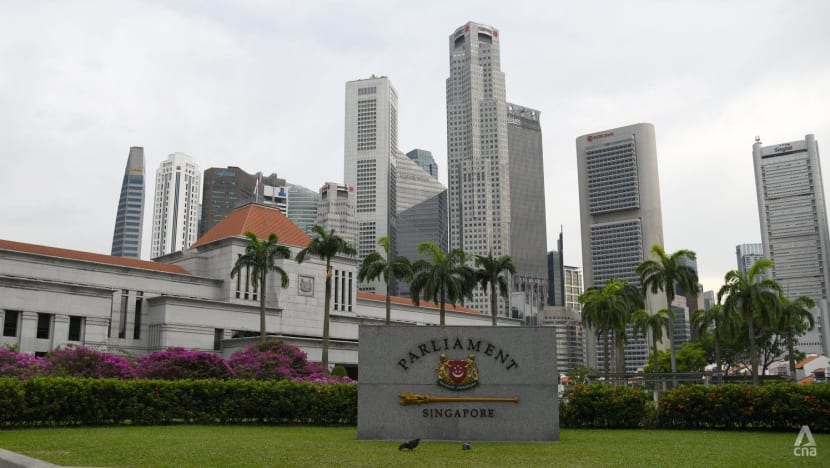CNA Explains: Repealing a law and amending the Singapore Constitution
The Government will repeal Section 377A of the Penal Code and amend the Constitution of Singapore to protect the definition of marriage from being challenged constitutionally in the courts. What does this process entail? And how long will it take?

The Singapore Parliament building. (File Photo: CNA/Calvin Oh)
SINGAPORE: The Government is set to repeal Section 377A of the Penal Code and amend the Constitution of Singapore to protect the definition of marriage from being challenged constitutionally in the courts.
Section 377A criminalises sex between men. Section 12 of the Women's Charter defines marriage as being between a man and a woman; same-sex marriages are void.
Prime Minister Lee Hsien Loong made the announcement during the National Day Rally speech on Aug 21. But what does it mean to repeal a law and amend the Constitution? What does the process entail, and how long will it take?
CNA spoke to Assistant Professor Benjamin Ong from the Yong Pung How School of Law at the Singapore Management University to find out more.
How is a law repealed?
An ordinary Act of Parliament – or part of an Act of Parliament, such as Section 377A of the Penal Code – can be repealed by another Act of Parliament, explained Asst Prof Ong.
The first parliamentary step in repealing a law is the introduction of a Bill to that effect. Bills are draft laws that become Acts of Parliament after they are passed by Parliament and assented to by the President.
“Like all Acts, the repealing Act must be passed by a simple majority – that is, more than half – of Members of Parliament (MPs) who are present and voting at a session of Parliament,” said Asst Prof Ong, adding that this number does not need to be half the total number of MPs.
“It will then be sent to the Presidential Council for Minority Rights, whose duty is to call attention to any provision that may have a discriminatory effect on racial or religious minorities.”
If there is no such discriminatory effect, then the Bill will be sent to the President for his or her formal assent.
How is the Constitution amended?
The Constitution of Singapore is the supreme law of the land. It sets out the country’s political framework and also contains provisions relating to fundamental liberties, citizenship and public service.
The Constitution can be amended through an Act of Parliament, but in terms of the number of votes required, the threshold for constitutional amendments is higher than that needed for the repeal of a law.
“An Act to amend the Constitution must be passed by at least two-thirds of the total number of MPs, excluding NMPs (Nominated Members of Parliament),” said Asst Prof Ong.
“Note that it’s two-thirds of the total number of MPs, excluding NMPs, not just two-thirds of the number of MPs who are present and voting at a session of Parliament.”
NMPs cannot vote on amendments to the Constitution.
This means that at least 63 votes from the 92 elected MPs and two Non-Constituency MPs would be required to amend the Constitution. The ruling People's Action Party (PAP) has 83 MPs.
When was the last time a law was repealed?
Termination of laws or sections of the law is a regular part of the parliamentary process.
“There is nothing really special about repealing laws. Enacting, amending and repealing Acts of Parliament are part and parcel of Parliament’s regular business,” said Asst Prof Ong.
“Just last month, Parliament passed an Act that repealed certain parts of the Endangered Species (Import and Export) Act 2006 and replaced them with new provisions, so as to enhance Singapore’s law on the trade in endangered species.
“In May, Parliament passed an Act to repeal the Adoption of Children Act and replace it with a new, overhauled version.”
When was the last time the Constitution was amended?
Similarly, debating and voting on constitutional amendments are part of an MP’s regular work.
“The Constitution was last amended earlier this month following the creation of the Singapore Armed Forces’ Digital and Intelligence Service,” said Asst Prof Ong.
“The amendment was to give the President the power to veto an appointment of the Chief of the Digital and Intelligence Service, just as the President has the power to veto appointments of the Chiefs of the Air Force, Army and Navy.”
Prior to that, the Constitution was amended in May to raise the fine quantum for the disqualification of MPs.
Who is the party whip, and what is their role?
The party whip is described by the Singapore Parliament website as the disciplinarian of a political party.
The whip ensures that there are sufficient party members in the chamber to support the party’s position and that MPs vote according to the party’s line.
Dr Janil Puthucheary, Senior Minister of State for Health and for Communications and Information, is the current Government whip.
The whip is occasionally lifted to allow MPs to vote "according to their conscience".
Speaking to CNA on Aug 22, Deputy Prime Minister Lawrence Wong said that the PAP does not intend to lift the whip when the issue is debated in Parliament as it is a “matter of public policy”.
There may be consequences for MPs who do not follow the party line when the whip is not lifted.
“The party may impose consequences for MPs who fail to vote in accordance with the party line – the most serious is that they may be expelled from the party,” said Asst Prof Ong.
“If the PAP’s whip will not be lifted, that means that the PAP’s whip will ensure that PAP MPs vote in accordance with the party line, namely, what was announced by the Government in recent days,” he added.
“So it is extremely unlikely that any PAP MP will, for example, vote against the repeal of Section 377A.”
The whip has only been lifted in Parliament on a handful of occasions. The first time the whip was lifted was back in 1969, when the House voted to legalise abortion, according to a TODAY report.
Since then, the whip has been lifted at least five times, including in July 2017 when Parliament debated the public dispute between the Prime Minister and his two younger siblings over their father's house at 38 Oxley Road.
Related:
How long will it take for it to become law?
According to the Singapore Parliament's website, Bills are typically introduced by ministers on behalf of the Government. These are known as government Bills.
Bills can also be introduced by any MP – these are known as private member's Bills.
It will take time to come up with the text of the Bills that will repeal Section 377A and amend the Constitution as the Government has described, said Asst Prof Ong.
“The text is drafted by the Legislation Division of the Attorney-General's Chambers (AGC) – just as how one might engage a lawyer to draft the text of a contract or a will,” he said.
“That process takes time. As with all legal texts, precision and accuracy are paramount.”
At least two clear days before a government Bill is introduced, a notice of introduction that has been signed by a minister must be given to the Clerk of Parliament, together with a copy of the Bill, said the AGC's website.
For a private member's Bill, the notice of introduction must be given at least four clear days before the introduction of the Bill.
All Bills must go through three readings in Parliament.
On the first reading of a Bill, the long title of the Bill is read out. It is then handed over to the Clerk of Parliament who is responsible for printing and circulating the Bills to the MPs.
For most Bills, with the exception of urgent Bills, a second reading can only take place after at least 10 days have passed since it was printed and circulated to MPs and appeared in the Government Gazette.
“According to Parliament’s Standing Orders, there must then be at least 10 days for MPs to consider the Bills,” explained Asst Prof Ong.
“In practice, it could take even longer before there is time for the Bills to be debated in Parliament.”
The ensuing debate could “take anywhere from minutes to days”, Asst Prof Ong added.
On the second reading, a general debate may cover the general merits and principles of the Bill, said the AGC website.
After a Bill has been read a second time, it will stand committed to the committee of the whole Parliament, which has the power to make such amendments to the Bill as it thinks fit.
After the Bill has been considered by the committee of the whole Parliament, the Bill is ready to be read a third time.
But should the Bill require special consideration, Parliament can send it to a select committee of MPs. In such situations, members of the public are invited to make written representations to the select committee and may also be invited to give evidence before the select committee.
Deliberations and enquiries of the select committee are limited to the Bill and relevant amendments.
“After the Bill has been considered by the select committee, the Bill is then reported from the committee of the whole Parliament where it is ready to be read a third time,” the AGC website said.
“On the third reading of the Bill, amendments, if any, will be proposed. The debate at the third reading is confined to the contents of the Bill. Any reasoned amendment which raises matters not included in the Bill must be ruled out of order. The Bill is then put to vote.”
Under the Constitution, all Bills passed in Parliament - except for money Bills, urgent Bills or Bills affecting defence, security, public safety, peace or good order in Singapore - must be sent to the Presidential Council for Minority Rights.
“According to the Constitution, they have 30 days to make their report on whether the Bills have any discriminatory effect,” said Asst Prof Ong.
“If there is none, then the Bills will be sent to the President for her formal assent. Only then will they become Acts of Parliament.”
The date an Act comes into force is typically determined by the minister in charge of the Act. A commencement notification will also be published in the Government Gazette.
An Act can also state that it will only come into effect on a certain date in the future, noted Asst Prof Ong.



















